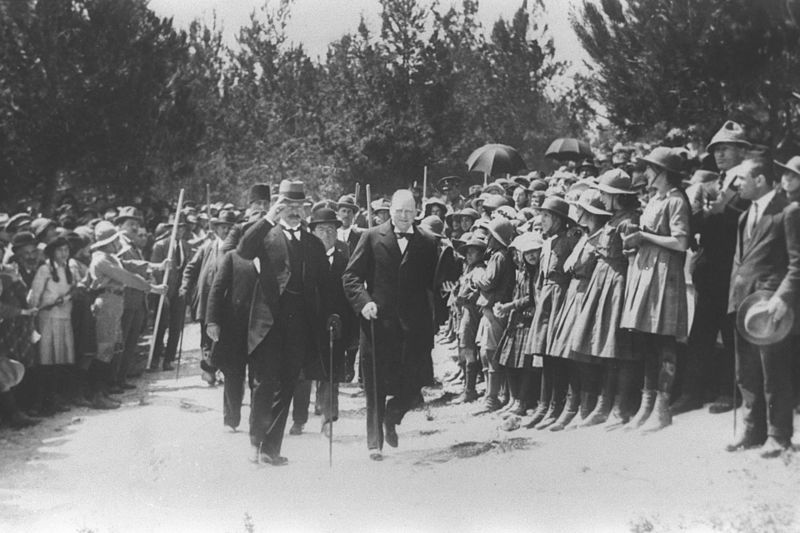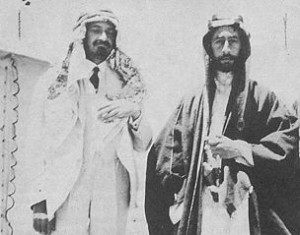
When Did Churchill Become a Zionist?
Q: Zionist and Israel supporter
“Churchill, a Zionist, was first to call for the creation of Israel in 1905.” Where and when in 1905 did he say that? —G.H., New York City
A: Date undetermined
Churchill was probably a Zionist by 1905. Reader Gene Kopelson (Comments, below) notes Michael Makovsky’s evidence of young Winston’s early respect for Jews and many Jewish friends. This didn’t make him a Zionist per se, but he certainly had become one by the time of the Balfour Declaration in 1917. But I can find no public statement calling for an independent Israel until 1948. Until then he called for a “Jewish National Home.” With his characteristic optimism, he believed Arabs and Jews in Palestine could coexist. He pointed to the talent of the Arabs. And he praised the Jews for their horticulture and irrigation projects. Indeed in today’s Israel, Arabs comprise 20% of the population.
Cairo, 1921
Headed by Churchill in 1921, the Cairo Conference set the borders of the modern Middle East. There he opted for the Zionist idea, what he called a “Jewish National Home” within Britain’s Palestine Mandate, roughly coinciding with what is now Israel. The rest of the Palestine Mandate became the Arab state of Jordan. To a delegation of Palestinian Arabs in Jerusalem on 28 March 1921 Churchill declared for a Jewish National Home:

And where else could that be but in this land of Palestine, with which for more than 3000 years they have been intimately and profoundly associated? (Churchill by Himself, 175)
Churchill’s impressive achievement at that time was to convince two Arab potentates, King Abdullah in Jordan and King Feisal in Iraq, to tolerate a Jewish Homeland in their midst. This situation prevailed until Britain gave up the Palestine Mandate (without resolving the tensions) after World War II. In the 1948 war Israel secured independence.
A world war later…

…on 10 December 1948, Churchill spoke in the House of Commons. He regretted that Britain and the West had lost the opportunity to make a permanent settlement in the Middle East. This is the first admission that I can find that he accepted partition and an independent Zionist state:
I always had in my mind the hope that the whole question of the Middle East might have been settled on the largest scale on the morrow of victory and that an Arab Confederation, comprising three or four Arab States—Saudi-Arabia, Iraq, Transjordania, Syria and the Lebanon—however grouped, possibly united amongst themselves, and one Jewish State, might have been set up, which would have given peace and unity throughout the whole vast scene of the Middle East. As to whether so large a policy could have been carried into being I cannot be sure, but a settlement of the Palestine question on the basis of partition would certainly have been attempted, in the closest possible association with the United States and in personal contact with the President, by any Government of which I had been the head. But all this opportunity was lost. (Churchill by Himself, 176-77)
Hopes and regrets
Churchill supported the Zionist state, declaring in the House of Commons in 1949: “…the coming into being of a Jewish State in Palestine is an event in world history to be viewed in the perspective, not of a generation or a century, but in the perspective of a thousand, two thousand or even three thousand years.” (Churchill by Himself, 175)
But in 1951 he deplored British policies after the Second World War. These, he said, “led to the winding up of our affairs in Palestine in such a way as to earn almost in equal degree the hatred of the Arabs and the Jews.” (Churchill by Himself, 439).
Many who still have hope for Churchill’s optimism accept a “two state solution” for Palestine and Israel. But the two separate Palestinian entities, Gaza and the West Bank, subdivide the latter’s population. A solution with a chance of success might contemplate a shift of peoples to create a contiguous state. No one seems to want to grasp that nettle (which caused havoc in India in 1947). Even in 1948, Churchill recognized that it would not be easy.
Further reading
“How Winston Churchill Preserved the Dream of Israel, July 1922” (2018)
“Churchill and Lawrence of Arabia: A Conjunction of Two Bright Stars” (2020)







2 thoughts on “When Did Churchill Become a Zionist?”
Not making a distinction between a secular Zionist state E European in nature that Stalin created from a wandering pious people recognized by religious practice has plagued the understanding of modern ‘Israel’ for millions of Christians.
–
Not W European? Why were they wandering? Ah, good old Uncle Joe, he knew not what he wrought
Michael Makovsky in Churchill’s Promised Land (Yale Univ. Press, 2007, p46) notes that young Winston was impressed by the mourning of Disraeli in 1881 when he was six, and shared his father’s respect for Jews. Makovsky notes Lord Randolph taking him to house parties at Lord Rothschild’s house, and Winston’s friendships with Lionel Rothschild, Baron Maurice de Forest and Ernest Cassel. The latter managed some of WSC’s finances and was a lifelong friend. While none of this made him into a Zionist, it must have been part of his later pro-Zionist initiatives in Parliament and Palestine.
Comments are closed.